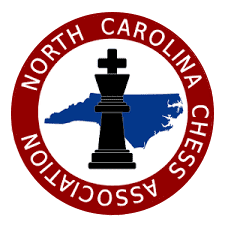
North Carolina Chess Association
NCCA officers
Charles Roberson – President
John Timmel – First Vice President
Grant Oen – Scholastic Vice President
Wayne H. Spon – Secretary/Treasurer
North Carolina Gambit – May 2022
Contributors
Dr. Walter High
Charles Roberson – Editor
John Timmel
Wayne Spon
Web support, edit, and distribution
John Timmel
In this issue, you will find:
Walter – ALTO (At Least Twenty-One) a roaring success
Wayne – Benjamin Franklin and the Morals of Chess
Charles – Interview with the 2021 NC Senior Champion Mark Hoshor
John – ALTO report, and this month’s “To Move and Win” problems
We’re looking for contributors to the Gambit!
Submit your games, articles, etc. to the editor Charles Roberson at croberson2@triad.rr.com
___________________________________________________________________________________
CHESS NUGGETS – May 2022
A Monthly Blog for North Carolina Chess Players
ALTO (At Least Twenty-One) a roaring success
by Walter High (wmhigh@nc.rr.com)
The Charlotte Chess Center (CCC) has revived the ALTO tournament, originally put on by the Carolinas Chess Initiative in Burlington (2018 and 2019). The first versions drew slightly over 60 players, but with the promotional skills and veteran staff of the CCC, this first Charlotte version drew 107 participants. There were 40 players from outside North Carolina! They came from as far away as Texas, Minnesota, and Connecticut.
Peter Giannatos did some serious promotional work through Twitter and through websites for adult chess players. A fun bonus was his promise to buy each player a drink ticket to the hotel bar after the evening round on Friday. That turned out to be an opportunity for the players to meet each other and make new friends. Peter also provided game analysis for some of the lower rated players in the skittles area after rounds, a service that was greatly appreciated. Other players watched him analyze and chimed in with ideas and questions.
The Championship section was won by GM Elshan Moradiabadi (NC) and GM Megesh Panchanathan (NC), each with a 4.0/5.0 score. They drew each other head-to-head and then each drew a different player for their other half point round. The U1800 section was won by Ishan Patel (SC), who still was sporting a provisional rating. He finished with 4.5/5.0. The U1400 section was won by Steven Fies (NC) who entered with no rating at all as this was his first OTB tournament. He had been playing online for less than two years and had to be persuaded by his coach, GM Elshan Moradiabadi, to try an OTB tournament. He reluctantly came to Charlotte, but left hooked on the in-person game!
Those of you who have been in chess for at least a decade are aware that there is a large contingent of older players who are known as the “Fischer Generation” because they got hooked on chess during the Fischer-Spassky world championship match in the summer of 1972. I would like to suggest that we now have a “Pandemic Generation” on our hands: a large group of players who took up chess online during the recent health crisis and are now venturing into OTB chess. Look at the numbers in this tournament: U1400 section — won by an unrated player, 9 of the top 13 were either unrated or provisional, and 21 of the 34 in the section were also unrated or provisional; U1800 section – top 2 players and 3 of the first 5 were unrated or provisional; Championship section – only 2 unrated or provisional, but these don’t really count as they are players new to the USA with foreign FIDE ratings. Those of us who organize tournaments need to work really hard to help retain these new players to keep the game strong and growing in North Carolina.
Those of you who missed the chance to play this tournament should consider coming for the next one. The feedback was very positive and the turnout was large enough to make this format viable for either once or twice a year gatherings.
___________________________________________________________________________________
Benjamin Franklin and the Morals of Chess
By Wayne Spon
The recent Ken Burns PBS documentary on Benjamin Franklin noted that he was not only an inventor, printer, journalist, postmaster and diplomat but he was also an avid chess player. As a young man, he learned the royal game while also studying Italian with a friend. Both were equally matched on the board and the victor would impose a language task on the loser such as a grammatical translation. Franklin remarked, “we thus beat one another into that language”. This exercise was classic Franklin – mixing enterprise with pleasure, chess play with self-improvement.
His enthusiasm for the game had company among his fellow revolutionaries such as Jefferson, Monroe, Madison, and Adams but Franklin was known to be the best of the lot, not only as a player but as a writer on the subject. In December 1776, the Continental Congress appointed Franklin to France as its ambassador to develop Franco-American relations and to secure a critical military alliance against King George III and Great Britain. He practiced diplomacy during the day and chess play at night at the famed Café de la Regence known for having Kermur Sire de Legal and Francois-Andre Philidor among its players. Franklin considered chess as his cultural priority in Paris rather than opera and he played whenever he could with colleagues and admirers. The competition and discipline that chess instilled in him helped Franklin to achieve diplomatic success during the American Revolution. He insisted that the time and energy that he devoted to the game was crucial to moving America along its path to independence. In his diplomatic dealings with France, chess taught him to evaluate possible outcomes of any situation, make decisions carefully and rationally, and to maintain hope of success despite setbacks.
In 1779, while he was the U.S. diplomat in France, he published an essay, “The Morals of Chess”. He began the discourse by a brief history of the game’s origin and evolution, equating its influence to that of civilization itself. The body of the essay referred to “life as a kind of chess, in which we have often points to gain, and competitors or adversaries to contend with, and in which there is a vast variety of good and ill events, that are in some degree, the effects of prudence or want of it”. He then listed and explained the following proficiencies that chess teaches: Foresight, Circumspection, Caution, and Perseverance. He also discussed adherence to rules, chess etiquette, no interference from a 3rd party and to be gracious in victory or defeat. This essay was later published in the 1786 Columbian Magazine and is considered the first chess article printed in the United States.
There are several anecdotes of Franklin’s games in which he would make an analogous comparison to America’s war for independence. One such incident occurred when his opponent was the Duchess of Bourbon. She had placed her king onto a square which was controlled by one of Franklin’s chess pieces. Rather than politely inform the Duchess that she illegally moved her king into check, the sly Franklin captured her king and removed it from the chessboard. The Duchess reminded her opponent,” We do not take kings”. Franklin grinned like the Cheshire cat and said, “We do in America”.
References:
The Morals of Chess; Benjamin Franklin; The Columbian Magazine,1786
The Best of Chess Life and Review; 1988
The Immortal Game; David Shenk, 2006
___________________________________________________________________________________
NC Chess Interview
Interview with NM Mark T. Hoshor by Charles Roberson
Mark Hoshor is a NC chess player, a National Master and the winner of the 2021 NC Seniors State Chess Championships. He will be NC’s representative in the 2022 Irwin National in California. NC Chess interviewed Mark for this month’s newsletter.
- What is your background outside of chess?
I am a retired IT professional with a significant knowledge of the business aviation industry thru my 30+ year career at Gulfstream Aerospace in Savannah, GA. I’ve played many different professional roles but grew up primarily on the application and data side of the house. In a technical capacity I worked numerous rewarding software projects to include engineering design, product lifecycle management, aircraft maintenance compliance and content management. In a management capacity I have had the opportunity to lead and mentor high performing teams. As a certified enterprise architect I can provide a discipline to effectively translate business needs into an IT strategy.
As a side venture, I partnered with a close friend to develop technology to enable women at risk of stillbirth or preterm labor to self-monitor fetus health at home using a fetal heart and uterine activity monitor. Results were transmitted to an online medical records system for review by authorized healthcare professionals. We deployed in 2004 and were far ahead of our time and have helped many women thru trying times.
I’ve taken a few data visualization courses after retirement to scratch my technical itch.
For the past year-plus my primary focus has been planning and execution to successfully relocate from Savannah to North Carolina. It has been a bit of a logistical challenge but the end is in sight.
I’ve been married for over 30 years to Lucilla, a gifted and creative artist and sculptor. She taught computer art and animation at the Savannah College of Art and Design for over thirty years. We have been blessed with two amazing adult children – both creative artists and musicians.
I’m an avid bicyclist, yoga practitioner and swimmer. As we age it is imperative to exercise and keep moving. I eat healthy and love to cook with Szechuan and Italian styles being my favorite. I’m an amateur musician who plays piano and clarinet. I have diverse musical tastes ranging from classical to progressive rock and ambient.
- Do you teach? and who (age groups…), how (online…)
I do not currently teach.
In the early 90s I did take on one child student as a favor for close family friends. Alex Dery-Chaffin progressed from ~1400 to a peak of 2156 before setting aside chess as a young man to pursue his entrepreneurial passions.
I recently had an opportunity to be a guest lecture at Triangle Chess and may choose to take on younger motivated students in the future as a means to giving back time to the game that has brought me so much pleasure and meaning.
- What is your favorite life lesson from chess or vice versa
Chess is an invaluable tool to help impart life lessons to include:
- recognition that there are consequences for decisions
- the ability to think more than one step ahead
- the ability to understand and assess possible outcomes based on a decision or series of decisions
- patience
- critical thinking
The analogy of chess and life breaks down in one key regard: chess is a one-vs-one game while real-life involves multiple participants with competing agendas, goals and desires.
- Do you have a favorite tournament?
From a historical perspective, the 1953 Zurich International Chess Tournament was full of top quality fighting chess. The game annotations from David Bronstein’s tournament book were well written and helped impart key strategic and tactical considerations.
- How does it feel to be 2021 NC Senior State Chess Champ?
Winning the tournament was a pleasant surprise. I had followed the pre-registrations and did my best to prepare. After three rounds I had 2.5 points versus tournament leader Erik Walker who seemed unstoppable at 3 points. We met in the fourth round and I was able to clinch a victory. Erik went on to win his last round in style. When the dust settled Erik and I ended up tied for first place with 4 points each. As a NC resident I was honored with the NC senior championship plaque, a bottle of red wine and a travel stipend to help underwrite my participation in the upcoming 2022 John T. Irwin National Senior Tournament of Champions in CA.
- How long have you been striving for it?
I moved into NC in June of 2021 and came upon the upcoming senior tournament in Burlington. I had previously won the Georgia Senior Championship twice and was excited to play in a similar senior competition in a new state.
- How do you celebrate a victory?
You can start to feel a victory coming on during the game. There is a point where you realize you have a decisive advantage. Bringing the full point home is fulfilling but not overly emotional. Typically, there is another round immediately to be played and the celebration can wait until after the tournament.
- How do you deal with a loss?
Chess is a perfect game in that no information is hidden from either player. The truth is on the board. If you lose, it is because you made a mistake. Losses sting and can create the potential for a lack of confidence.
If you want to improve, focus on the games you lose and turn it into learning opportunities. When the game is over, see if your opponent would be willing share their thoughts. Set your emotions and ego aside.
- What other titles have you won?
I have performed well in many local/regional tournaments over the decades. In terms of state titles:
- 1977 Virginia Junior State Champion
- 1985 National Master title
- 1998 Georgia State Co-Champion
- 2014 Georgia Senior State Champion
- 2015 Georgia Senior State Champion
- How/who did you get into chess?
My father Alfred and older brother Alan both played chess. My father also owned an oriental chess set carved from ivory that was quite exquisite that captured my youthful attention. Then came the Fischer-Spassky match. My father gifted me with a match book by C.H. O’D Alexander. I was also heavily influenced by my middle school guidance counselor (Kenneth Butler). Ken was a 1400 rated player who organized the school club and introduced me to the local chess community. Other players who were influential in my early years included expert Jerry Flowers, senior master Gary McGowan, expert Tom Burgess and senior master Dr. Errol Liebowitz.
- How long have you been playing chess?
50+ years
- How old were you when you started playing chess?
My first games of chess were played at ~10 years of age.
- Were there breaks and when did you get serious?
I started to take seriously starting in 1973 at the age of 13. I played chess non-stop until my first year in college. I took a break for several years before jumping back in. I took another long OTB break as we raised our family. Being retired I’m hoping to have the time to study and improve further.
- What was your first chess rating?
In my first USCF tournament I lost four games in a row before finally winning in the fifth round against an opponent named Bowers. My first provisional rating was 1210.
- What was your peak chess rating?
My USCF OTB rating peaked in 1996 at 2252. I’ve played enough games as a National Master to have established a rating floor of 2200 which (unfortunately) I have recently tested.
I consider myself a life-long learner and may make a push for new highs after I have settled down in my new home.
- What is your favorite thing about chess?
Chess is a deep game where a gnat can take a drink of water while an elephant can take a bath. It is up to the individual to determine how immersed they wish to become. I would categorize myself as primarily a positional player. I enjoy the creation of favorable pawn structures and the maneuvering of pieces to slowly increase the pressure until there is a tactical culmination. I visualize chess where each piece contributes to the greater whole and works in harmony, typically having common squares where the power of pieces overlap/intersect.
- When did you break each of the class levels… Was there one that took longer than you’d have liked?
My progression was relatively slow relative to today’s youth. This was due to the lack of online chess platforms, chess computers and educational chess content. Progress was thru book study, tournament and informal OTB play. There would often be a plateau followed by a big break-thru and then another plateau. Overall I experienced a relatively steady rise to obtain an expert rating by 1984 but had a hard time breaking thru to master. My informal mentor (Dr. Errol Liebowitz) suggested I should improve my opening theory. I would often get inferior positions out of the opening and then play catch-up. Developing a solid opening repertoire helped overcome this weakness. I also was fortunate to be in an active chess scene with numerous other experts and masters that helped push me to new heights.
- What do you like about chess in general?
Chess is an artistic medium that provides a means to express oneself. The player’s character traits are often reflected in their game style. Some tactical players go for the full-on brawl and will either be victorious or implode in a glorious fireball. Other players may be totally risk-averse and seek to play in a prophylactic style to snuff out their opponent’s counterplay before it even starts.
- What is your least favorite aspect of chess?
Computers!
In playing tournaments, I’m often not playing my opponent. Instead, I’m often playing against moves my opponent memorized that were subject to intensive computer analysis. The ability to lookup an opponent, load all their games into an application and enable targeted opening preparation is a current but unfortunate reality. The real game often doesn’t start until at least move 10+.
The rote memorization of opening theory is a compelling reason to promote Chess960 (Fischer Random). It would be impossible for a human to memorize opening theory and instead the game starts on move 1.
- What do you like about chess tournaments?
The social aspect of meeting fellow chess enthusiasts is a key draw, especially considering the last few years of pandemic driven isolation. I love to travel and visiting a new site is always fun.
- Where would you like to go with chess from here?
My near-term goal is to be a solid representative for NC at the upcoming John Irwin National Tournament of Senior State Champions.
Once I’ve settled into my new home I hope to have time to revisit my chess studies. I’d be quite happy to break OTB USCF 2300. I’m considering hiring a coach to help me achieve this goal. I also enjoy the role of chess ambassador by visiting chess clubs while travelling. Although my opponent and I may not speak the same language, we can communicate through our moves.
- Do you have advice for others?
Try to minimize emotional response to chess, especially losses. Don’t get discouraged. I have lost thousands and thousands of games on my way to being a master player. Build a basic opening repertoire for both Black and White pieces. Continually work tactical puzzles to create “muscle memory” for recurring tactical themes. Learn basic endgame theory. Review well annotated games.
- Who is your favorite player?
Magnus Carlsen is truly the Mozart of chess. I see recurring raging debates online about the strongest player ever. I would offer one observation that dates back to 1675 when Isaac Newton stated: “If I have seen further it is by standing on the shoulders of Giants€.
- Which players would you like to meet? Which have you enjoyed meeting?
I haven’t had the opportunity to meet world class players. I did walk into a simultaneous exhibition by Boris Spassky in Chicago in the mid-80s. I also had the opportunity to play (and defeat) Arthur Bisguier in a simultaneous exhibition in Norfolk, VA.
I enjoy meeting strong chess enthusiasts who share a common passion and don’t take themselves too seriously. Laughing is good for the soul!
- What tournaments would you like to spectate?
I’d like to spectate any large well-run tournament in a scenic setting with world class talent.
- What tournaments would you like to participate in?
I enjoy meeting and playing players of my generation so no doubt I’ll continue to play in senior oriented tournaments.
Any tournaments in a scenic location would align well with my desire to travel. I’ll be looking for smaller European chess tournaments in scenic locations once I’m in a position to again travel internationally.
I also enjoy team tournaments and have participated multiple times in the US Amateur with great teammates!
- Do you have a favorite historical chess game?
Alexander Kotov vs Svetozar Gligoric (Zurich 1953) really brought home the pragmatic application of Nimzovich’s blockade theory. Gligoric sacrificed two pawns to smoother White’s pieces behind his own pawns.
https://www.chessgames.com/perl/chessgame?gid=1084369
- Do you have a favorite game of your own?
Unfortunately, I’m in the process of moving and my favorite historical games are in storage somewhere! Even my ChessBase media is in storage and not yet installed on my new laptop.
From the NC Senior Championship my favorite game would be against Erik Walker. We met in the fourth round with Erik having a great tournament with 3 consecutive wins. As Black I played a rarely used opening variation in the Modern Defense to try to create an unbalanced position and avoid any potential opening preparation. The Beefeater variation cedes the bishop pair in exchange for permanently damaging White’s pawn structure. White missed a tactical shot that game me a strong advantage that quickly transitioned to a winning position.
Walker (1954) Hoshor (2200) 1. d4 g6 2. c4 Bg7 3. Nc3 c5 4. d5 Bxc3+ 5. bxc3 f5 6. e4 fxe4 7. Qc2 Qa5 8. Bd2 Nf6 9. f3 e3 10. Bxe3 d6 11. Bd3 Nbd7 12. f4 Nb6 13. Nf3 Bd7 14. Ng5 Qa4 15. Qb3 Bf5 16. Kd2 Qd7 17. Ne6 Bxd3 18. Kxd3 Nfxd5 19. cxd5 c4+ 20. Qxc4 Nxc4 21. Kxc4 Rc8+ 22. Kd4 Qa4+ 23. Kd3 Qc4+ 24. Kd2 Qxd5+
- Have you moved around (States, Cities…?)
I born in Sumter, SC in 1959 and immediately moved to Japan for 4 years. My family relocated to the Hampton Roads VA area. We moved to Fort Walton Beach, FL for a couple of years and then back to VA when my Dad retired from the USAF. I finished middle, high school and college in the Hampton Roads area and took on my first professional IT job at Newport News Shipbuilding. I moved to Naperville, IL in 1986 to take on a consulting position and then onto Savannah, GA in March of 1987. I met my future wife Lucilla and we married, had two wonderful children and pursued our professional careers. We both retired in 2019 and decided to move away from the coast. Being a data scientist, I mashed up a lot of data to identify where we should consider relocation. Based on a number of factors we targeted the Chapel Hill region of NC. Upon arrival we rented a home in Apex and subsequently discovered the American Tobacco Trail (ATT) and Cary Greenway System. Being avid cyclists we elected to build a home directly adjacent to the ATT in western Cary.
- What are your favorite online chess sites (playing and training)
I’m active on both chess.com and lichess.org. My favorite activity is blitz 960 Chess (aka Fischer Random). I also play 960 Chess in daily chess tournaments and matches.
- What is/are your favorite chess book
My favorite books as a developing chess player were:
- Zurich International Chess Tournament, 1953 (Dover Chess) by David Bronstein
- My System by Aron Nimzovich
- Who is/are your favorite chess book author?
Cyrus Lakdavala is a prolific and talented author with a great writing style.
- Who is/are your favorite chess streamer
Watching either Nakamura or Carlsen play and share their thoughts during the game is entertaining. I also enjoy IM Sagar Shah’s (ChessBase India) videos. He presents excellent game analysis in a colorful and entertaining manner.
- What other games do you enjoy or compete in?
I have competed in NL Hold-em poker and billiard tournaments. I’m probably the rough equivalent of a B-class player in these games.
- Is/Are there chess club(s) that you’d like to visit
William Clausen is doing an amazing job with Triangle Chess. He recognizes and appreciates the need to continually bring young players into the game as a means of building for the future of chess. He hosts a wide variety of events, conducts lessons and supports chess coaches. His success can be measured by the number of regional youth that are nationally ranked.
I love visiting chess clubs wherever I travel with my favorite being the Marshall Chess Club in NYC. I hope to have a European tour and visit historical clubs. I’d appreciate any suggestions from your readers. I’d also like to visit the St. Louis club. I’ve also yet to have the opportunity to visit the Charlotte Chess Center.
- What is the funniest thing that happened to you due to chess?
I enjoy being the unknown new guy walking into a chess scene. I don’t tend to say much and let my moves speak for themselves. I also enjoy seeking out chess hustlers in places I visit.
In terms of the most awkward thing related to chess actually occurred at the NC Senior Championship. I was informed by the TD (Charles Roberson) I was talking out loud during the game! Apparently I was so deep in thought I was verbalizing my ideas. John Timmel, my third round opponent, confirmed my behavior. John found it helpful to know what I was planning!
- What is the funniest thing that you saw happen at a chess club or tournament?
Maybe not funny but certainly memorable was a post-tournament trash talking session between Klaus Pohl and Emory Tate at a Land of the Sky tournament in Asheville many years ago. Both were strong players and not shy to express their opinions as they one-upped each other.
- Anything you wish was done in NC Chess or US Chess?
I’d love to see a broader adoption of 960 Chess (Fischer Random). This would include a 960 rating and tournaments.
- Anything else you want to tell us?
If we cross paths, please introduce yourself! I love meeting chess enthusiasts.
___________________________________________________________________________________
…To Move and Win!
– John Timmel
With 107 players, this year’s ALTO was considered a success. Three GMs participated, including Elshan Moradiabadi, Magesh Panchanathan, and Ben Finegold. I can’t say enough about how smoothly this tournament was run. Everything about the tournament was top notch. The organizers, TDs and staff, playing conditions, hotel, hotel location, etc. was all A+. Thank you, Peter, Grant, and all those from the Charlotte Chess Center. Well done!
In the Open section, Moradiabadi resided on board one all five rounds, taking the winner’s plaque on tie-breaks over Panchanathan. Each had 4/5 with no losses, taking home $600 each. Ishan Patel took top u-1800 honors for $600 + plaque, as did Steven Fies in the u-1400 taking home $500 + plaque. Congratulations!
Link for the TOP BOARD GAMES ON LICHESS (includes u-1800 and u-1400 section games)
For the May …To Move and Win!
Two positions from the ALTO
May 2022 #1 Charlotte ALTO – White to move and win
Dominique Myers
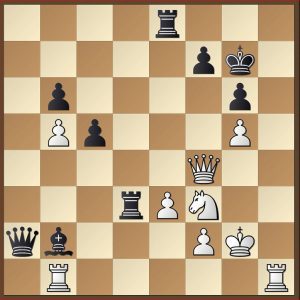
Elshan Moradiabadi
May 2022 #2 Charlotte ALTO – Black to move and win
Dominique Myers
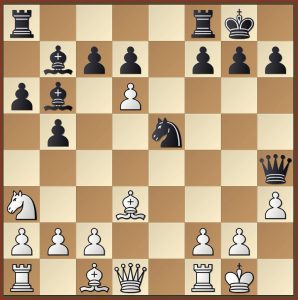
Anthony Parker
Solutions to last month’s problems
April 2022 #1 1949 USSR Championship – Black to move and win
Geller
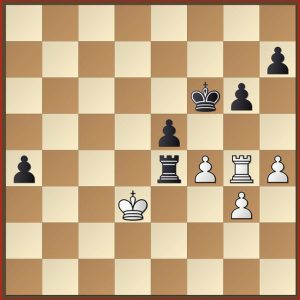
Flohr
….Kg7! the black “a” pawn queens
43….Kg7! 44.h5 a3 45.Kxe4 a2 46.hxg6 hxg6 47.Rg5 a1Q 48.Rxe5 Qc3 49.Rg5 Kf6 50.Kd5 Qd3+ 51.Kc5 Kf7 52.Kc6 Qd4 53.Kb5 Qc3 54.Kb6 Qc4 55.Kb7 Qe6 56.Kc7 Kf6 57.Kb7 Qd6 58.Kc8 Qc6+ 59.Kd8 Qb7 60.Re5 Qb6+ 61.Kc8 Kf7 0–1
April 2022 #2 1888 Nürnberg – White to move and win
Metger
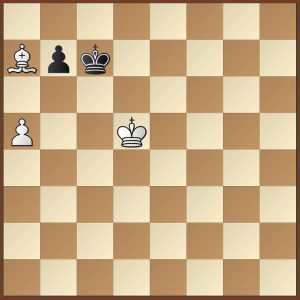
Paulsen
1.Kd4! (Kc5? b6+ draws, or 1, Kc4 b5+ draws) Kc6 (1….b5 2. a6! wins, or 1….Kd7 2. Kc5 wins) 2. Bb6 Kd6 3. Kc4 Kc6 4. Kb4 Kd6 5.Kb5 Kd7! 6. Kc5 Kc8! 7. Ba7! Kc7 8. Kb5 Kd7! 9. Bb8 Kc8 10. Bf4 1-0
___________________________________________________________________________________